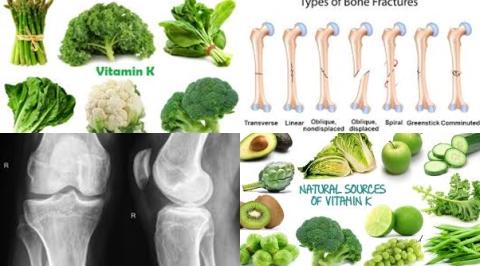
Objectives:
The association between dietary vitamin K intake and the risk of fractures is controversial. Therefore, this meta-analysis (review article) has been conducted.
Does dietary vitamin K intake reduce risk of fractures?
Study design:
This review article included 4 cohort studies and 1 nested case-control study, including 80,982 total subjects and 1114 fracture cases.
The fractures were assessed using confirmed self-reported, medical and radiological report. Dietary vitamin K intake was assessed with a food-frequency questionnaire (FFQ) in 4 studies, only 1 study used 4-day or 7-day food record.
Vitamin K intake in all included studies refers exclusively to the intake of phylloquinone (vitamin K1), which is the predominant form of vitamin K in foods.
All subjects were more than 30 years old.
Duration of follow-up for the included studies ranged from 6.9 to 10 years.
Most studies provided RRs that were adjusted for age, BMI, BMD, physical activity, vitamin D and calcium intake, smoking and alcohol consumption.
The Begg and Egger tests did not show any substantial asymmetry (p = 0.50 for Begg test and p = 0.32 for Egger tests). Further trim and filled meta-analysis showed that there were no trimming data added.
Results and conclusions:
The investigators found for highest vs. the lowest dietary vitamin K intake a significant reduced risk of 22% [RR = 0.78, 95% CI = 0.56-0.99, I2 = 59.2%, p = 0 .04] for fractures.
The investigators found for every increment of 50μg dietary vitamin K intake per day a significant reduced risk of 3% [RR = 0.97, 95% CI = 0.95-0.99, I2 = 25.9%, p = 0 .25] for fractures.
The investigators found a significant reduced risk of 24% [RR = 0.76, 95% CI = 0.58-0.93, I2 = 59.2%, p = 0 .04] for fractures in studies with more than 10 years of follow-up.
The investigators concluded that higher dietary vitamin K intake; at least 50μg dietary vitamin K intake per day decreases the risk of fractures. This review article offers additional evidence on the relationship between dietary vitamin K intake and risk of fractures. The benefit of vitamin K should be confirmed in future well-designed prospective cohort studies and clinical trials.
Original title:
Vitamin K intake and the risk of fractures: A meta-analysis by Hao G, Zhang B, [...], Cao X.
Link:
https://www.ncbi.nlm.nih.gov/pmc/articles/PMC5413254/
Additional information of El Mondo:
Find more information/studies on vitamin K and elderly right here.